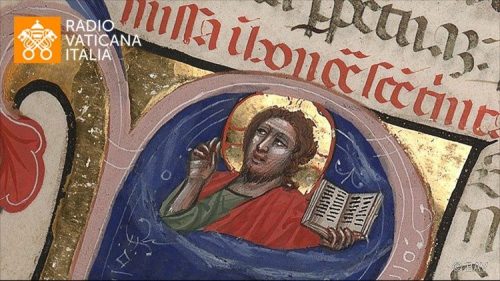READING OF THE DAY
RV 11:4-12
I, John, heard a voice from heaven speak to me:
Here are my two witnesses:
These are the two olive trees and the two lampstands
that stand before the Lord of the earth.
If anyone wants to harm them, fire comes out of their mouths
and devours their enemies.
In this way, anyone wanting to harm them is sure to be slain.
They have the power to close up the sky
so that no rain can fall during the time of their prophesying.
They also have power to turn water into blood
and to afflict the earth with any plague as often as they wish.
When they have finished their testimony,
the beast that comes up from the abyss
will wage war against them and conquer them and kill them.
Their corpses will lie in the main street of the great city,
which has the symbolic names “Sodom” and “Egypt,”
where indeed their Lord was crucified.
Those from every people, tribe, tongue, and nation
will gaze on their corpses for three and a half days,
and they will not allow their corpses to be buried.
The inhabitants of the earth will gloat over them
and be glad and exchange gifts
because these two prophets tormented the inhabitants of the earth.
But after the three and a half days,
a breath of life from God entered them.
When they stood on their feet, great fear fell on those who saw them.
Then they heard a loud voice from heaven say to them, “Come up here.”
So they went up to heaven in a cloud as their enemies looked on.
GOSPEL OF THE DAY
LK 20:27-40
Some Sadducees, those who deny that there is a resurrection,
came forward and put this question to Jesus, saying,
“Teacher, Moses wrote for us,
If someone’s brother dies leaving a wife but no child,
his brother must take the wife
and raise up descendants for his brother.
Now there were seven brothers;
the first married a woman but died childless.
Then the second and the third married her,
and likewise all the seven died childless.
Finally the woman also died.
Now at the resurrection whose wife will that woman be?
For all seven had been married to her.”
Jesus said to them,
“The children of this age marry and remarry;
but those who are deemed worthy to attain to the coming age
and to the resurrection of the dead
neither marry nor are given in marriage.
They can no longer die,
for they are like angels;
and they are the children of God
because they are the ones who will rise.
That the dead will rise
even Moses made known in the passage about the bush,
when he called ‘Lord’
the God of Abraham, the God of Isaac, and the God of Jacob;
and he is not God of the dead, but of the living,
for to him all are alive.”
Some of the scribes said in reply,
“Teacher, you have answered well.”
And they no longer dared to ask him anything.
WORDS OF THE HOLY FATHER
Dear Brothers and Sisters, Good morning!
This Sunday’s Gospel sets before us Jesus grappling with the Sadducees, who deny that there is a resurrection. They pose a question to Jesus on this very matter, in order to trip him up and ridicule faith in the resurrection of the dead. They begin with an imaginary case: “A woman had seven husbands, who died one after the other,” and they ask Jesus: “Whose wife will the woman be after her death?”. Jesus, ever meek and patient, first replies that life after death does not have the same parameters as earthly life. Eternal life is another life, in another dimension where, among other things, there will be no marriage, which is tied to our existence in this world. Those who rise — Jesus says — will be like the angels and they will live in a different state, which now we can neither experience nor imagine. This is the way Jesus explains it.
But then Jesus, as it were, moves to the counterattack. And he does so by citing the Sacred Scripture with a simplicity and originality which leaves us full of admiration for our Teacher, the only Teacher! Jesus finds proof for the resurrection in the account of Moses and the burning bush (cf. Ex 3:1-6), where God reveals himself as the God of Abraham, and of Isaac and of Jacob. The name of God is bound to the names of men and women to whom he binds himself, and this bond is stronger than death. And we can also say this about God’s relationship with us, with each one of us: He is our God! He is the God of each one of us! As though he bore each of our names. It pleases him to say it, and this is the covenant. This is why Jesus states: “God is not the god of the dead, but of the living; for all live to him” (Lk 20:38). And this is the decisive bond, the fundamental covenant, the covenant with Jesus: He himself is the Covenant, he himself is the Life and the Resurrection, for by his crucified love he has triumphed over death. In Jesus, God gives us eternal life, he gives it to everyone, and thanks to him everyone has the hope of a life even truer than this one. The life that God prepares for us is not a mere embellishment of the present one: it surpasses our imagination, for God continually amazes us with his love and with his mercy.
Therefore, what will happen is quite the opposite of what the Sadducees expected. It is not this life that will serve as a reference point for eternity, for the other life that awaits us; rather, it is eternity — that life — which illumines and gives hope to the earthly life of each one of us! If we look at things from only a human perspective, we tend to say that man’s journey moves from life to death. This is what we see! But this is only so if we look at things from a human perspective. Jesus turns this perspective upside down and states that our pilgrimage goes from death to life: the fullness of life! We are on a journey, on a pilgrimage toward the fullness of life, and that fullness of life is what illumines our journey! Therefore death stands behind us, not before us. Before us is the God of the living, the God of the covenant, the God who bears my name, our names stand before us, as he said: “I am the God of Abraham, of Isaac, of Jacob”, and also the God with my name, with your name…, with our names. The God of the living! … Before us stands the final defeat of sin and death, the beginning of a new time of joy and of endless light. But already on this earth, in prayer, in the Sacraments, in fraternity, we encounter Jesus and his love, and thus we may already taste something of the risen life. The experience we have of his love and his faithfulness ignites in our hearts like a fire and increases our faith in the resurrection. In fact, if God is faithful and loves, he cannot be thus for only a limited time: faithfulness is eternal, it cannot change. God’s love is eternal, it cannot change! It is not only for a time: it is forever! It is for going forward! He is faithful forever and he is waiting for us, each one of us, he accompanies each one of us with his eternal faithfulness.
(Angelus, 10 November 2013)

